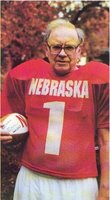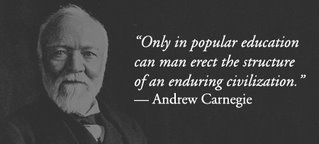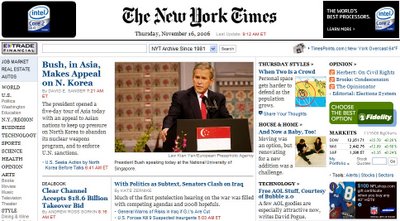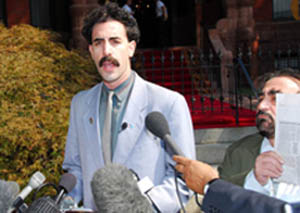I thought it well to let
Beatrice's steaming self-exteriorizations speak for themselves. Until last evening, at any rate, when, as I walked Max, AKMA's little text devoted to the behavior and offerings of his dog during their regular morning exercise came again to mind -- triggered, no doubt, by Max's similar elaborate reconnoitering of the precise destined coordinates of his own prolific excremental obligations.
Citing Augustine, AKMA first teases us with hope -- a hope denied in his book,
Faithful Interpretation -- that meaning will be found "in" the sign:
Within the highly limited sense in which one can discuss any matter of cognition with regard to a dog who has fluff for brains, the location of her morning donation seems meaningful. Now, if that premise be in any sense true, this seems to present a case in which the meaning truly is in the text. Her text constitutes as it were a natural sign of Bea’s existence and digestive activity (“Natural signs are those which, apart from any intention or desire of using them as signs, do yet lead to the knowledge of something else, as, for example, smoke when it indicates fire”; On Christian Doctrine II.i.2).
Augustine's natural signs here seem congruent with
Pierce's indexical signs -- that is to say:
Indexical: These signs have a causal link to their referents. Often, these signs can be considered to be parts of their referents: smoke, for example, is an indexical sign of a fire. A footprint, too, is an indexical sign: the print is caused by the foot.
Another example might be a scar, which, instead of being a cause, is understood as the direct effect of some other cause - Odysseus's scar, for example, is a sign
from that time when the boar struck me with his white tusk when I was in the region of Parnassus along with the sons of Autolycus.
Although it turns out also to be an identifying mark that enables Odysseus to establish that he is actually himself to several members of his household. Already, then, we have a mark that "reads" in more than one way -- it both looks back to a moment in the hero's childhood as well as serving as a signature, or unique warranty, that confirms that this old decrepit beggar who suddenly showed up is in fact the lord of the premises.
The scar is a fact, but one that, to certain readers within the local interpretive community of those familiar with Odysseus, admits of more than simple scarness. It's an old wound, yet one that in the presence of the right community opens and speaks volumes.
We quickly see how contingent such readings are in Homer's world: Odysseus finds that his Penelope, the unweaving arch-skeptic, will not be content with this sort of evidence. She's seen and heard it all - every story, every pseudo-Odysseus, fake scars and all. She sets a higher bar -- the stranger must disclose the secret of their marriage bed -- a sign forged within a community consisting of the singular intimacy of only two:
Woman, by heaven you've stung me now!
Who dared to move my bed?
No builder had the skill for that -- unless
a god came down to turn the trick. No mortal
in his best days could budge it with a crowbar.
There is our pact and pledge, our secret sign,
built into that bed -- my handiwork
and no one else's! (Odyssey 23, Fitzgerald trans.)
The sign is not signifying until someone with certain additional knowledge comes along. The act of interpretation involves the sign, the knowledge/context to which the sign is a clue, and the knower who puts together these things in a syllogism:
- (I see) This man has a scar just so on his knee.
- But (I remember) Odysseus had such a scar.
- (I say) This man is Odysseus.
Getting back to Beatrice and AKMA: barely has AKMA suggested that some meaning could lie within Beatrice's externalizings than he takes it back:
On the other hand, the “meaning” in this interaction isn’t an ingredient of the text. Other dogs may infer Bea’s identity and salient characteristics on the basis of the textual deposit, but those remain inferences — not the extraction of a meaning-constituent within the text she leaves.
And,
To the extent that Bea has done something expressive, something meaningful, the expression and meaning depend on a system of instinctual (?) expectations and conventional interactions. Even considering this quite material example, I don’t see how we can ascribe intrinsic “meaning” to the text.
Fair enough. Signs do not "contain" meaning because meaning tropes the sign -- gives it a spin, -- a subtle process of a first (signifier) occasioning a second (signified) thanks to the offices of a third (reader).
But this is altogether separate from the question of whether we have only texts and interpretations, or some facts too.

(A digression: It is quite possible that within the semiotosphere of dogs, part of Bea and Max's seemingly disproportionate locating behavior is due to some obligation they feel to read the signs around them, using their best sense, the nose. Their acts of sniffing and precise positioning could possibly suggest a scanning of the traces of prior texts, with all the identifying and signifying possibilities thereof. Bea and Max then would be readers who seek quite purposively those texts which occasion the sort of visceral response that provokes a meticulous comment pungently applied to the margin. No matter that AKMA happens to pick up the bulk of the material, the next wag that comes along will sense the play of the palimpsest well enough.)

On the other hand, suppose that -- entirely outside this caninical order of signifiers -- AKMA encounters a neighbor during his walk, and, while engaged in lively conversation, fails to observe a lengthy gloss left by Bea upon the grass behind him. If some unsuspecting soul were to unwittingly step into the marginalia, who would question the factuality of the signifier?
In short: addressing the question of where meaning resides does not annihilate fact. There might be some
question about whether a
certain text has one or several Q's, if other circumstances warrant it - i.e., handwriting, or code, or mistyped letters. But this is not a question of interpretation, any more than the convention of a stop sign makes it pretty difficult not to acknowledge that something is a stop sign. Interpretation does not arise out of the disappearance of the sign, but out of its being woven into a textual arena in which strange things can and do happen to signs. I hope it will not be out of place in this context to suggest that before a community of readers can interpret certain signs, they must be given some indication of what to expect.
This need becomes more urgent when someone clearly takes extra pains to impose new meaning by using a sign in a way never before used. Much depends on whether, for example, we decide the speaker means "this is a sign of my body," or whether he means, in fact, "this is my body." Nothing indexical can tell us. Nor can some pre-existing community of interpreters who re-cognize this saying, like Odysseus's scar, as an iteration, or replication, or indication, of something already knowable and known. No, when we have none of these fall-back positions, how do we decide whether we are witnessing a sign that puts the sign of the bread and the interpreter at the usual interpretive remove from the significance being declared, or whether, as a matter of fact, some new thing has entered the world?




















